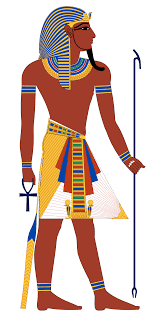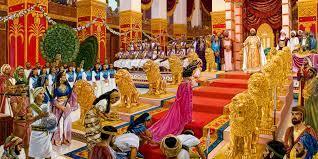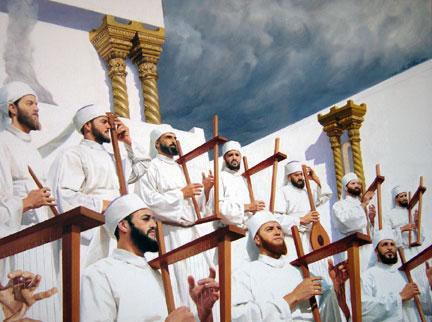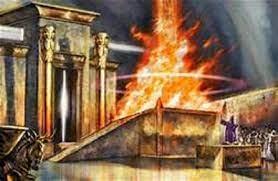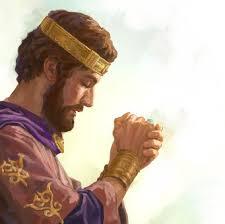Bv – Solomon’s Treasure First Kings 10:14-29 and 2 Chronicles 1:14-17 and 9:13-28
Solomon’s Treasure
First Kings 10:14-29 and
Second Chronicles 1:14-17 and 9:13-28
Solomon’s treasure DIG: How did Solomon make his money? Why did Solomon need an ivory throne overlaid with gold? Why did Solomon need five hundred shields that required 2,525 pounds of gold to make? How did Solomon violate Deuteronomy? As a man of unparalleled wealth, why do you think Solomon later wrote Ecclesiastes that wealth is meaningless?
REFLECT: In studying the incredible riches of Solomon, what do we learn about the possession of riches by a believer? What guidelines do you find in First Timothy 6:17-19? Is it right for believers to accumulate large amounts of wealth? Why? Why not? How does having money give the appearance of wisdom? Where is your heart on this? When do you say, “Enough is enough.”
Where your treasure is, there your heart will also be.
Solomon’s treasure: Now the golden age of Solomon’s empire, which stands as the high-water mark of kingship in Isra’el before the coming of Messiah, is described. The key word in this section is gold. The author, inspired by the Ruach Ha’Kodesh, wants to impress us with the splendid glories of Solomon’s golden kingdom. But we also need to keep all this in its proper biblical context, remembering how quickly earthly glory will pass away, and how easy it is for gold, and wealth in general, to become our god.
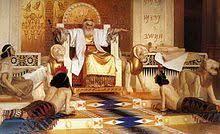
One way to measure Solomon’s glory is to weigh all of his gold, which is what people still do today. The Bible says that the weight of the gold Solomon received annually came to twenty-five tons. This is a staggering figure. It amounts to hundreds of millions of dollars in today’s economy – maybe as much as a billion. But that is not all. We need to include Solomon’s international trade and count all the gold which came from customs duties and sales taxes; also, all the Arab kings and regional governors brought gold and silver to Solomon. We don’t know exactly how much gold that was, but we can make a fair estimate by visiting the king’s summer palace: King Solomon made 200 large shields of hammered gold; fifteen pounds of gold went into one shield. He also made 300 smaller shields of hammered gold, with seven-and-a-half pounds going into one shield; the king put these in the House of the Lebanon Forest (1 Kings 10:14-17; 2 Chronicles 9:13-16). Today we would make them into bars, but the gold in Solomon’s treasury was fashioned into ceremonial shields. Each shield was worth a small fortune, and Solomon had five-hundred of them, both large and small.
The king also owned many other precious treasures of opulent beauty. Consider his great throne, he made it out of ivory and overlaid it with pure gold. The throne had six steps and a gold footstool, a back with a rounded top, arms on either side of the seat, two lions standing beside the arms, and twelve more lions standing on each side of the six steps. Nothing like it anywhere in the world (First Kings 10:18-20; Second Chronicles 9:17-19). The lions were emblems of the tribe of Judah, and thus they served as royal symbols of the king’s God-given-power.
All King Solomon’s drinking vessels were of gold; and all the utensils in the House of the Lebanon Forest were of pure gold. None was of silver, for in Solomon’s time it was regarded as having little value. There was so much gold that it led to the devaluation of silver. He was also successful in business. The king had a fleet of large ships that would go to Tarshish along with Hiram’s fleet; once every three years the “Tarshish” fleet came in, bringing gold, silver, ivory, apes and peacocks (First Kings 10:21-22; Second Chronicles 9:20-21).
So, King Solomon surpassed all the kings on earth in both wealth and wisdom. All the kings on the earth sought to have an audience with Solomon, in order to hear his wisdom, which God had put in his heart. Each one brought his present – articles of silver, articles of gold, clothing, armor, spices, horses and mules; and this continued year after year (First Kings 10:23-25). All these treasures, both animal and mineral, kept flowing into Jerusalem. Solomon’s kingdom became a major center for international trade. With all the revenues and exchanges, to say nothing of the taxes and tariffs, the king’s global business accumulated an enormous fortune.
The golden age: This all sounds very impressive, but how does the Bible evaluate the glory days of Solomon’s empire? What are we to make of all his gold? What can the king’s treasure teach us about the spiritual implications of wealth and our relationship to the good things of this life? We need to recognize that there is nothing inherently wrong with gold. It is good in itself. So are apes, peacocks, silver, and even ivory, depending on how it is obtained. These are beautiful things created by God for the enjoyment of His people. Gold is especially beautiful, which is one of the reasons why it is universally acknowledged as a valuable treasure. In keeping with this reputation, the Bible often puts gold in a positive light, as we have seen in the interior of the Temple. There are hundreds of references to gold in the TaNaKh and the B’rit Chadashah, and many of them recognize its lasting splendor.
We must remember that the golden age was ADONAI’s answer to Solomon’s prayers. In Psalm 72 the king asked for the wealth of the Gentile nations – not for himself alone, but for the sake of God’s Kingdom. The king’s gold was an answer to prayer, therefore, and also the fulfillment of that promise. Back at the beginning of his reign, when Solomon honored YHVH by asking for wisdom, the LORD promised him the added blessing of incomparable riches: But I am also giving you what you didn’t ask for, riches and honor greater than that of any other king throughout your life (First Kings 3:13). So this is what we are to make of Solomon’s gold: it was the answer to his royal prayers and the fulfillment of a divine promise, to the glory of the kingdom of God.
This passing splendor: Yet for all its glory, we always need to remember that earthly gold is only a passing splendor. No matter how costly it is, from an eternal perspective gold is extremely limited in value. Therefore, we should be careful not to be overly impressed with the glories of Solomon’s kingdom, let alone our own earthly treasures. Soon Solomon’s glory days would be over. He was already reaching a point of diminishing returns. How many golden shields can one king really use, anyway?
To keep things in perspective, we need to hear the other side of what the Bible says about gold. While openly acknowledging its splendor, the Bible also mentions some spiritual things that are much more valuable. Gold is not as precious as wisdom, for example (Proverbs 16:16; Job 28:15-17). Also, gold is less valuable than the Word of God (Psalm 19:10 and 119:127). As valuable as it is, gold cannot compare with the priceless treasure of knowing and doing the will of God or believing in the Gospel of Yeshua Messiah. This is because gold cannot satisfy the soul. Therefore, we should not put our confidence in earthly treasures. Job was on the right track when he said: If I have made gold my trust or called fine gold my confidence, if I have rejoiced because my wealth was abundant . . . I would have fallen to God above (Job 31:24-25 and 28).
Remember this well: you will lose all your gold when you die. You may well lose it sooner than that, as many people do. But even if you amass a large fortune, and manage to hold on to it until you are old and gray, you will still have to leave it behind when you die. Charles Spurgeon told the story of a shipowner who was asked about the state of his soul. “Soul?” the man replied, incredulously. “I have no time to take care of my soul. I have enough to do just taking care of my ships.” But as Spurgeon pointed out, the man was not too busy to die, which he did only a week later. Is there a better example of this truth than King Solomon? How quickly his glory passed away! In First Kings 14:25-26 we read how Shishak king of Egypt came up against Jerusalem. He took away the treasures of the house of ADONAI and the treasures of the king’s house. He took everything. He also took away all their shields of gold that Solomon had made.
But of course, Solomon was dead by then anyway. He had already left all his earthly treasure behind, as everyone does. Thus passes the glory of the world, as Solomon knew it would. In Ecclesiastes 2:18, the king lamented having to leave everything to the man who will come after me, and who knows whether he will be wise or a fool. As it happened, Solomon’s worst fears were realized: he left his treasures to his fool of a son Rehoboam, who proceeded to lose it all. If we say this about Solomon, we should also be prepared to say it about ourselves and our own golden treasures, for they too will pass away.211
Fool’s gold and other temptations: The most important thing in life is to glorify ADONAI. And this is where the life of Solomon took a tragic turn. As wise as he was, at least for most of his reign, somewhere along the way, Solomon started making some deadly spiritual compromises (see the commentary on Revelation, to see link click Bc – The Church at Thyatira). He stopped choosing to follow God with his whole heart every day, and started living for his own glory, seeking his own security and pursuing his own pleasure (see Br – Solomon’s Choice). Not only that, at some point Solomon started to neglect the Torah.
Moshe commanded: When the king has come to occupy the throne, he is to write a copy of this Torah for himself in a scroll. It is to remain with him, and he is to read in it every day, as long as he lives; so that he will learn to fear ADONAI his God and keep all the words of this Torah and these statutes and obey them; and so that he will not turn aside either to the right or to the left from the mitzvah. In this way he will prolong his own reign and that of his children in Isra’el (Deuteronomy 17:18-20). If he would have done so, he would have read this: Be careful not to forget ADONAI your God . . . otherwise, after you have eaten and are satisfied, built fine homes and live in them, and when . . . increased your silver and gold . . . then . . . forget ADONAI your God, who brought you out of the land of Egypt, where you were slaves (Deut 8:11-14).
The fact that Solomon kept accumulating more and more gold was a sure sign that he was going down the wrong road. The Torah explicitly told the king of Isra’el not to acquire for himself excessive silver and gold (Deuteronomy 17:17). Maybe it’s hard to decide exactly how much gold is too much, but for Solomon it was probably somewhere between his first and his five-hundredth golden shield. The desire to horde was starting to take control of his life. Yeshua said: Where your treasure is, there your heart will be also (Matthew 6:21).
Solomon faced another serious temptation, which was to put his trust in military power. This teaching ends with a further sign of spiritual danger. Solomon amassed chariots and horsemen; he had 1,400 chariots and 12,000 horsemen; he assigned them to the chariot cities and to the king in Jerusalem. The king made silver in Yerushalayim as common as stones, and he made cedars as abundant as sycamore-fig trees in the foothills. Solomon’s horses had been brought from Egypt and from Cilicia, with the king’s agents having bought them from the dealers in Cilicia at the going price. A chariot from Egypt cost fifteen pounds of silver shekels and a horse three-and-three quarters pounds [of shekels]; all the kings of the Hittites and the kings of Aram purchased them at these prices through Solomon’s agents (First Kings 10:26-29; Second Chronicles 1:14-17).
Solomon also had 4,000 stalls of horses for his chariots and his 12,000 horsemen; he assigned them to the chariot cities and to the king in Jerusalem. He ruled over all the kingdoms from the Euphrates River through the land of the Philistines to the border of Egypt. The king made silver in Yerushalayim as common as stones, and he made cedars as abundant as sycamore-fig trees in the foothills. They brought horses for Solomon from Egypt and from all countries (Second Chronicles 9:25-28).
To put it bluntly, King Solomon had become an arms dealer for the Middle East. As the middleman between the Egyptians and the Syrians – importing and exporting chariots, buying low and selling high – Solomon turned a handsome profit. Yet, in the long run this proved to be very foolish. In later days the Syrians and the Egyptians both attacked the Israelites (First Kings 14:25-26; Second Kings 5:1-2). Thus, the king was supplying his enemies with the weapons for Isra’el’s own destruction!
What Solomon did was also a direct violation of the Torah, which said the king should not acquire many horses for himself or have the people return to Egypt to obtain more horses, inasmuch as ADONAI told you never to return that way again (Deuteronomy 17:16). By trading with Egypt for horses and chariots, Solomon was going to the place that he was forbidden to go. By the time we get to First Kings 11, Solomon will be spiritually bankrupt. But the warning signs of his eventual downfall are obvious in First Kings 10. His misguided quest for more and more gold, as well as his misplaced confidence in military power. King David had prophets and priests who advised him and even warned and rebuked him, but nobody seems to have encouraged Solomon to read Deuteronomy and make a life for himself rather than making a fortune.212
Glory days: One day there will be another golden Kingdom. In fact, Solomon’s gold held the promise of this most glorious Kingdom. It was for this reason, perhaps more than any other, that ADONAI gave Solomon so much gold: He did it to prepare us for the golden Kingdom of God. When Yeshua preached the kingdom of God, he assumed that people had some idea what a kingdom was, and He used Solomon’s kingdom as the best example, Yeshua called it: Solomon in all his glory (Matthew 6:29).
Yet for all its glory, Solomon’s gold gives us only a glimpse of the greater glories of the Kingdom of Yeshua Messiah. When we get to the book of Revelation, where the Bible opens a window on eternity, we see many glittering splendors. The crowns of the twenty-four elders are made of gold (Revelation 4:4), each having gold bowls filled with incense (Revelation 5:8). There is a gold altar in front of the throne of God (8:4). The main street in the New Jerusalem will be made of pure gold (Revelation 21:21). In fact, the whole heavenly City is described as a golden metropolis – a city of pure gold (see the commentary on Revelation Fu – The New Jerusalem had a Great, High Wall with Twelve Gates). This is the place to store our treasure, not in a world that is passing away, but in a golden age that will never end (see Revelation Fq – The Eternal State).213
Dear Heavenly Father, Praise You that a loving relationship with You is the greatest gift that anyone can have – worth far more than any amount of earthly wealth! Praise You for offering the gift of Yourself to those who love You. The treasures of this world will soon be gone, but the treasure for those who love You, of everlasting joy and peace, will last for all eternity! Knowing that the One who raised the Lord Yeshua will raise us also with Yeshua, and will bring us with you into His presence. . . For our trouble, light and momentary, is producing for us an eternal weight of glory far beyond all comparison (Second Corinthians 4:14, 17). I love to serve You with all my heart, for You are my very great treasure! In Yeshua’s name and power of His resurrection. Amen





